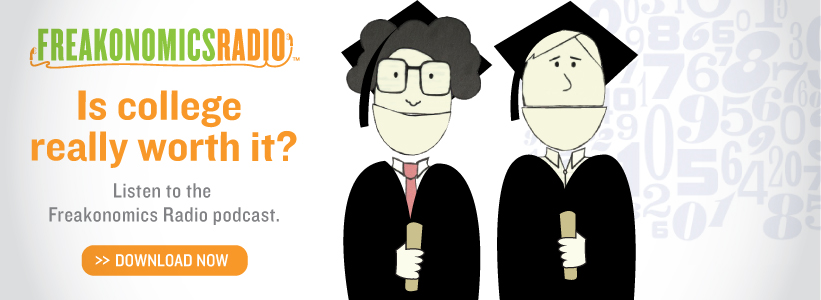
Our latest Freakonomics Radio podcast is called “Freakonomics Goes to College, Part 2.”
Part 1 explored the value of a college degree and the market for fake diplomas. This episode looks at tuition costs and also tries to figure out exactly how the college experience makes people so much better off.
You can download/subscribe at iTunes, get the RSS feed, listen via the media player above, or read the transcript below.
While there are a lot of different voices in this episode, including current and recent college grads, the episode is also a bit heavy on economists (d’oh!), including:
+ David Card at Berkeley, whose education papers are here;
+ Ronald Ehrenberg at Cornell, whose recent paper “American Higher Education in Transition” discusses tuition inflation;
+ Betsey Stevenson; her blog contributions are here, and she tweets too;
+ Justin Wolfers, whose blog writing is here; he too tweets; additionally, he and Stevenson are a matched pair — heading for the University of Michigan, by the way — who also appeared in our “Economist’s Guide to Parenting” podcast, along with daughter Matilda, whom they discuss again in this episode; and:
+ Steve Levitt, who has this to say:
LEVITT: So I did a study many years back that looked at Chicago public schools, and it turned out that the single biggest impact of school choice in Chicago schools was giving kids who were not doing well in the traditional kinds of schools the opportunity to go to trade, culinary school, or schools that actually taught them real skill. So, clearly you can see how going to school to learn real skills like nursing or something like that could have huge returns. The tougher question is these general liberal-arts educations, what are you learning? And that’s something that economists haven’t even tried to really think about very much.As we explain in the podcast, calculating the true costs of college isn’t simple. A sensible place to start is the College Board, whose website includes a Trends in College Pricing page, which compares tuition “sticker” prices versus net prices, and a Trends in Student Aid page, which catalogs various forms of financial aid. Here’s David Card on the potential returns to investment on a college education:
CARD: If you’re thinking about this as an investor, you know, you’ve got a kid and you’re thinking of sending them to college or not, you have to pay a lot of money upfront and then reap those returns later on. And several features of that are difficult. One is the cost that you have to pay upfront has gone up quite a bit, and the second is the uncertainty involved in whether the kid will actually successfully complete the degree. It’s a pretty risky investment.And here’s Betsey Stevenson on an overlooked angle of college costs:
STEVENSON: I think that people often make the mistake of not thinking through the problem as systematically and thoroughly as an economist would advise. So first of all, there are two major costs of college. Everybody thinks about tuition. But there is another equally important cost, and that’s the opportunity cost of not working. So when you go to college you’re going to forgo working a job that’s going to pay you some kind of salary. And while lots of students have part-time jobs, or try to fit some kind of work in while they’re in college, they’re obviously not doing the kind of work that they would be doing if they didn’t go to college.That said, the returns to education are, in a word, huge. College graduates earn more money, live longer, and are healthier and happier than similar people who don’t graduate from college. Is all this upside a product of the degree itself, or does college perform some kind of alchemy? To explore that angle, we hear from Amherst president Biddy Martin about the unlikely route she took to the land of higher education; and I travel back to Appalachian State to chat with my old documentary film professor Joe Murphy:
MURPHY: People are insisting on some measure to prove to them that their $100,000 investment or $40,000 investment is worth it. I can understand that. That’s a lot of money. But in reality, I don’t think there is a way to quantify the value of college. I know you can look at statistics about people who have a college education are better paid. I think you have to look at how quality of life issues. To me, ignorance breeds hatred. And if you can get people knowledgeable, there will be less hatred, more understanding. That’s my theory.(I spoke to a couple more favorite former professors that day, Leon Lewis and Jim Winders, and you’ll be hearing a separate podcast later in the fall that includes all three of them.)
One last highlight of the episode: a conversation with recent-ish University of Chicago grad Bourree Lam, editor of this blog and all-around Freakonomics superstar, talking with another recent grad about the hardship of not finding suitable work after graduation.
So what have we learned about college? Let’s give the final word to Biddy Martin:
MARTIN: It’s impossible to learn a completely different way of thinking about things without unlearning what one has already learned. And I think it’s important to realize that, because it’s often the case now that people think about education as the acquisition of new things as if it were an unproblematic and promising process simply of adding to what one already knows or thinks. And the truth is it is transformative, and that means upending a whole set of assumptions about how to see things, what’s possible, what’s real.

Nenhum comentário:
Postar um comentário